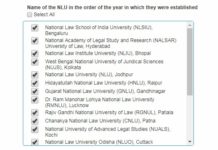This article has been submitted by Rushati Mukherjee for the CLATGyan Blog Post Writing Competition. If you think this article is a good read, ‘Like’ this article on Facebook (the button is at the bottom of this piece) or post a comment using the ‘comments’ section below.
***
Hello, all. I’m feeling a bit solemn this evening. Solemn, and rather pensive. I would greet you all with my usual chipper tones, but honestly, I’m not in the mood today.
In the writing of this post, I am referring particularly to the “Times Global” section of The Times of India, published on 8th May 2014, which was what I can only describe as a bundle of paradoxes.
As many will remember, a few months ago, the Indian Supreme Court overturned the Delhi High Court’s amendment of Article 377 of the Indian Constitution: an amendment that decriminalised homosexuality in India.
At that point, the nation reacted with outrage; I’m proud to say that at least in online, televised and print media, criticism was practically unanimous, including statements from national figures who are stalwarts in the political circuit. However, I was numb. In recent times, immediate reaction has not come easily to me; it seems that I need to let feelings incubate for a while before I can arrange them sufficiently to be able to express them. This handicap set in here: I could neither say nor feel anything, because I was too numb, mostly from grief and shock. However, that issue of TOI that I referred to at the beginning has finally acted as a catalyst, allowing me to put down in words what I feel about Article 377.
I read about all the craziness going on in the world right now. I read about hundreds of girls, my age or younger, held prisoner, with their lives unravelling around them and their spirits being crushed, as men who seem no better than pigs which fight to eat a living corpse, haggle to trade with their dignity. I read about a country on the brink of an ancient war that threatens to raise its ugly head once again, only to engulf the world in the fires of conflict inflamed by the crunch of the tyrant’s boot. I read about bloggers like me ensnared in twisted laws that strangle their voice: I read about a covert law that squeezes freedom out of free expression and another that lashes the speaker’s bare, sweating back, to leave only the silence of anarchy behind.
I read all this, and I think, God bless my India.
I’m not describing my country as any paragon of virtue: hell, very, very far from it. I of all people know the corruption that breeds in this country’s roots and decays its crumbling black soul. I know we are a volatile, forgetful nation with a great capacity for self-destruction, and destruction of the defenceless amongst us. I know all the social evil that lurks here, in every nook and cranny of every other life. I see it every day.
But above all that, beyond, is the India that right now, in this moment, is the safe haven where I do not live in fear of a government that is not able to protest the abduction of hundreds of innocents. There is the India in which I can put this article up on the web, and have no fear of being lashed for it. There is the India in which, in short, I have a legal system that is still capable of being enforced, still capable of protecting my spirit, still capable of avenging my body, if it should come to that. I know that there are hundreds of instances in which this thin veil has torn, but for right now, right here, my country is still one that is capable of holding together the rusting, creaking structure that can provide me with shelter, as an Indian and a human being.
And it is because I see that, that I ask, I beg of the Parliament: repeal 377. Reinstate that amendment.
I love my country. It is impossible to describe how, or indeed, even why, but I know I do. And I believe in it. I believe in its vision of a democracy for all: a Utopia that we may never reach but nonetheless aspire towards; I believe in that aspiration. I remember the complete faith I had in our legal system as a child; specifically, in the Supreme Court. In fact, I still remember reading the article that reported the Delhi High Court’s action, with pride threatening to burst out of my broad smile. I remember how secure I felt in the assurance that our courts know what’s right, and that they’ll do what’s right, always, without fail. I remember the joy I felt in knowing, or thinking I knew, that there was this guardian angel in the country that could put all to right in the spirit of its wisdom. It is perhaps because I felt this way that the ruling shook me so badly. The child in me was shattered, to tell the truth. It knew that the last vestiges of the world it believed in had been taken away from it.
As I had matured, I had not understood what business the government had in my bedroom. As long as I was not hurting anyone in anyway, surely it was alright. Surely the government would understand; surely they would let me express my love, when love it was, consensually, and safely, to whomever it applied to. Surely not, it would seem.
Recently, at my school awards ceremony, we had amongst us an august lady who was one of the first women to be appointed a judge in the Supreme Court. She told us about the law that declared that a woman, for the purpose of becoming an advocate, could not be “counted as a person”, and therefore could not be allowed to practice law. The entire hall drew in a collective breath at the sheer inhumanity of said law: how it refused the basic identity of being a human being to us of the fairer gender. Once, this law was held to be fully enforceable. But as time went on and society struggled out of its apathy, did we not change it? Did not the very same Supreme Court agree that laws are merely formal codifications of social mores, and that mores change over time; then, the laws based on such extinct norms must also change?
Who I choose to love is not the whole of my identity. It is, however, a part of it that no external entity has any right to define. My identity as a person is subject to scrutiny and prohibition under 377. But denying even a part of me goes against what I believe my India and my Supreme Court to be. I deserve my fundamental right to life, liberty and the pursuit of happiness. On the front page of that same issue of TOI, I read that the Supreme Court can apparently extend that right to the bulls of India. I understand and appreciate their gesture, but I ask: why not, then, to me?
I appeal to the Parliament: Repeal 377. Do it for the child in me that still believes you can be the institution I once thought you were. Do it for the adult in me that demands the right to live in a country that does not mutilate my identity. Do it for the Indian in me that believes the vision I have of this country- the vision our leaders had in setting up this country and fighting for its independence- can come true. Do it for the hundreds of thousands of those who feel the same way I do.
Repeal 377.
***
Rushati Mukherjee is a thinker, a creator and a dark vacuum of existential nothingness. She also writes things.















LOVE THIS. You need to win this so everybody can read this article and see the monstrous abomination that is Section 377. It may have been spawned in an earlier time where things were not acceptable until they were defined by the rigidly constructed barriers that is narrow thinking but times change, and so should our laws. It’s sad to see public outrage die with the news and I hope this piece strikes a chord again. Honestly, I love this.
P.S. Do you manage a blog? I’d love to read more!
Hello, Shuchita! My sincerest apologies fr this (very!) late reply, but college admissions are killing my soul ._. Yes, I do! You can find it here – http://unrealitynotreally.blogspot.com/
Thank you so much for your lovely comment!